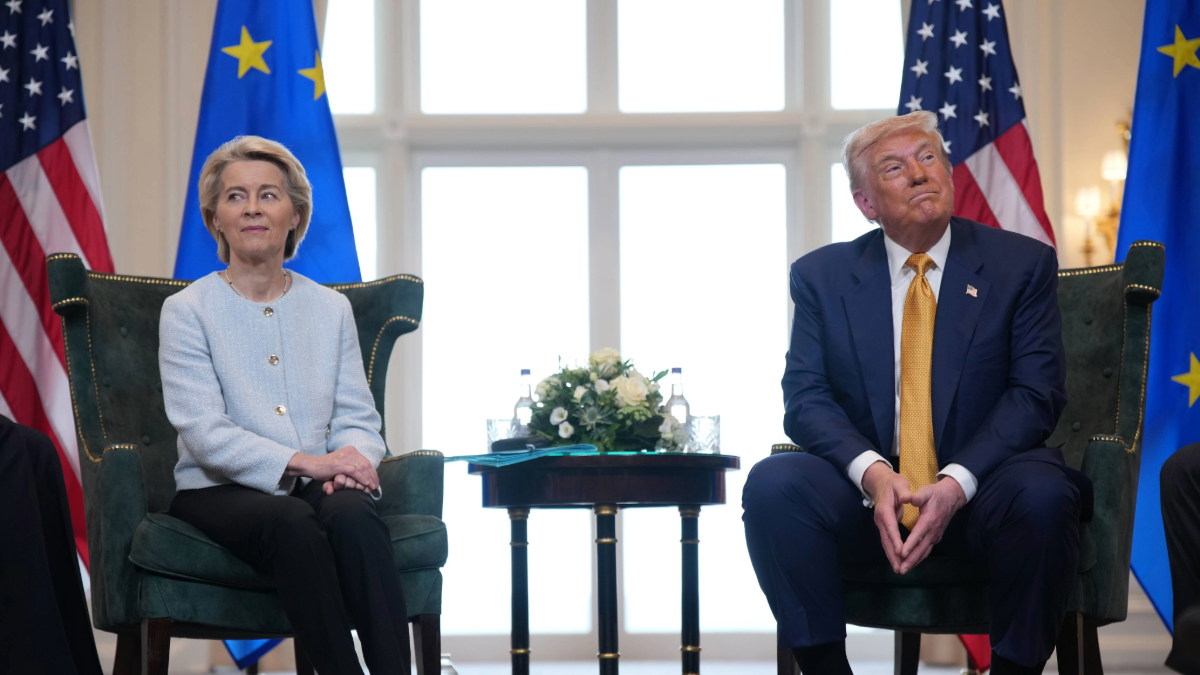How US Officials Are Pressuring Europe Over Its Platform Regulations
Cristiano Lima-Strong, Ramsha Jahangir / Aug 19, 2025This article was updated on August 26.

TURNBERRY, SCOTLAND — JULY 27: President of the European Commission Ursula von der Leyen meets with US President Donald Trump at Trump Turnberry golf club on July 27, 2025 in Turnberry, Scotland. (Photo by Andrew Harnik/Getty Images)
In recent months, top Republicans in Washington have banded together with US tech industry leaders to mount an escalating pressure campaign against the European Union’s landmark platform regulations, claiming they are tantamount to foreign “censorship.”
The broadside has spanned across trade negotiations, diplomatic overtures, and congressional investigations, and at the moment shows no signs of letting down, particularly as European regulators set their sights on allies to US President Donald Trump, like Elon Musk.
The standoff pits some of the world’s most powerful companies, coupled with the backing of the US government, against sweeping EU rules widely hailed as the most significant global attempt to grapple with online harms, known as the Digital Services Act (DSA).
Here’s a rundown of tactics Washington and Silicon Valley are using to influence Brussels:
Trade pressure
Since taking office, the Trump administration has repeatedly called on European leaders to soften or drop enforcement of the DSA in their negotiations over Trump’s proposed tariffs.
In a post on Truth Social late Monday (August 25), US President Donald Trump criticized digital taxes and related regulations, claiming they unfairly target American tech companies. “Digital Taxes, Digital Services Legislation, and Digital Markets Regulations are all designed to harm, or discriminate against, American Technology,” he wrote, warning of “subsequent additional tariffs” if such measures aren’t removed.
The US designated the regulations as a foreign trade barrier earlier this year in a report by the Office of the US Trade Representative, and has pressed the position in its talks with the EU.
Late last month, the US and EU reached a tentative agreement on a framework to stave off a trade war, in which most European goods would face a 15 percent import tariff.
While European officials initially suggested that the DSA had been spared in the deal, calling it a “red line” in their negotiations, the US has challenged the claim and suggested it’s still on the table as they finalize their terms.
The Financial Times reported that a rift between the two sides over the issue is part of what is holding up a final statement enshrining the agreement.
Diplomatic messaging
The US diplomatic corps has also entered the fray, with the State Department dispatching officials to relay reservations about the DSA and other European platform regulations to government leaders in EU member states and relevant agencies.
Under Trump and US Secretary of State Marco Rubio, the department has decried the Digital Services Act as a form of “Orwellian” censorship and alleged it is intended to stifle dissent against European leaders.
Earlier this month, Reuters reported that the State Department issued a cable ordering US diplomats to “regularly engag[e] with EU governments and digital services authorities to convey US concerns about the DSA and the financial costs for US companies.” The “action request,” signed by Rubio, said the rules posed an “undue" restriction on Americans’ free expression.
Immigration threats
In one of the Trump administration’s most aggressive retaliatory measures over the DSA, Rubio announced in May that the State Department would restrict visas “to foreign nationals who are responsible for censorship of protected expression in the United States.”
While the policy announcement did not explicitly call out the DSA, the department stated that it would not accept demands by foreign officials that “American tech platforms adopt global content moderation policies or engage in censorship activity that reaches beyond their authority and into the United States.” The remarks are likely to implicate those enforcing the law.
In a later statement to Tech Policy Press about the policy, a State spokesperson said the agency is “very concerned about the DSA’s spill-over effects that impact free speech in America.”
According to Reuters, the Trump administration is considering sanctions against European Union or member state officials involved in enforcing the bloc’s Digital Services Act. Two sources familiar with the matter said the move stems from US complaints that the law censors Americans and burdens US tech companies. It remains unclear which officials might be targeted, though internal discussions were held last week, Reuters reported on Tuesday.
Regulatory threats
The Federal Trade Commission entered the fray on Thursday, with Republican Chairman Andrew Ferguson saying the agency will "not hesitate to enforce the law" against companies that "censor Americans or weaken the privacy and security of their communications at the behest of a foreign power," a direct threat over DSA compliance. The remarks came just hours after the US and EU released a new joint statement on trade that still left their thorniest digital disputes unsettled.
Ferguson announced he sent letters to over a dozen tech companies questioning "how they will comply with U.S. laws protecting American consumers in the face of these foreign demands."
In the letters, Ferguson said that companies that engage in "censorship" in compliance with foreign regulations could violate Section 5 of the FTC Act, which prohibits "unfair or deceptive acts or practices in or affecting commerce." He also expressed concern that companies may weaken their encryption protections to comply with the Digital Markets Act (DMA), a worry tech companies and some digital rights advocates have echoed.
The threats mean that tech companies could face regulatory scrutiny in Europe if they fail to comply with the regulations, or at home if they follow through — under the Trump administration's interpretation of the laws.
Congressional scrutiny
On Capitol Hill, the Republican-led House Judiciary Committee has led a major offensive against the DSA, issuing subpoenas to tech companies to gather information about European regulators’ oversight efforts and issuing a report slamming the bloc’s rules. Chaired by Rep. Jim Jordan (R-OH), the panel has served as the DSA’s chief antagonist in the US Congress.
The committee last month issued a 145-page report that accused the EU of creating “a global censorship regime” that “infringes on American online speech” and alleged the “target” of the efforts is conservative speech. Democrats on the panel rebuffed the purported findings, issuing a memo on “the most misleading distortions and assertions” from the GOP report, including its suggestions that the DSA targets political debate and satire and is forcing global changes.
EU digital chief Henna Virkkunen has pushed back on Jordan’s barbs against the DSA, disputing his suggestion that the law regulates speech and emphasizing that regulators "have no power to moderate content or to impose any specific approach to moderation” in a letter. "We firmly rebut any censorship claims. The censorship allegations relative to the DSA are completely unfounded," a European Commission spokesperson told Reuters in August.
Jordan, who has spent much of the past year attacking DSA in the form of letters and public statements, took a more direct tack this month by leading a congressional delegation overseas to speak out against the DSA and other European platform regulations.
In a statement following the trip, Jordan said, "Nothing we heard in Europe eased our concerns about the Digital Services Act, Digital Markets Act, or [the United Kingdom’s] Online Safety Act.”
Tech synergy
Major tech companies and their lobbying groups, which for years have spoken out against both the DSA and the Digital Markets Act, the bloc’s watershed digital competition playbook, have cheered on Republicans as they seek to defang those regulatory efforts.
Musk’s X, which could soon face a massive fine under the DSA, has lauded the Judiciary’s report criticizing the rules, sharing it repeatedly on social media in recent days. Earlier this year, the company’s global affairs arm said that an enforcement action against it by the EU would represent “an unprecedented act of political censorship and an attack on free speech.”
NetChoice, a tech lobbying funded by Google, Meta, X and other tech companies, has also lauded the efforts by Jordan and the Trump administration and called on the US to “stand firm” against “EU digital protectionism” in its trade negotiations with the bloc.
In April, in response to the Commission’s fines against Meta under the DMA, Joel Kaplan, a former Republican advisor and the company’s head of policy, criticized the regulation as an attempt to “handicap successful American businesses.”
Authors

